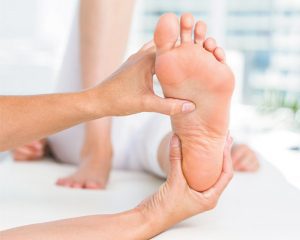 For today’s baby boomers, it’s more important than ever to stay healthy and active as they age. While growing older causes some unavoidable body changes, more boomers are focusing on healthy lifestyles that can help them prevent problems associated with aging such as mobility issues related to the feet and legs. Impairment of the lower extremities is a leading cause of activity limitation in older people, according to the US National Center for Health Statistics (NCHS).
For today’s baby boomers, it’s more important than ever to stay healthy and active as they age. While growing older causes some unavoidable body changes, more boomers are focusing on healthy lifestyles that can help them prevent problems associated with aging such as mobility issues related to the feet and legs. Impairment of the lower extremities is a leading cause of activity limitation in older people, according to the US National Center for Health Statistics (NCHS).
“Foot problems are a health concern that can lead to further complications like knee, hip, and lower-back pain, all of which undermine mobility,” says Lori DeBlasi, DPM, a podiatrist at Family Foot & Leg Center in Fort Myers and member of the American Podiatric Medical Association (APMA). “The human foot has been called the mirror of health. Systemic problems often related to age, such as diabetes, arthritis, and circulatory disease often can first be detected in the feet.”
Fortunately, boomers can do a lot to maintain and even improve their foot health. APMA offers the following advice to keep your feet pain-free.
Keep walking
Walking offers many benefits for both physical and mental health. If your feet hurt, however, you may find yourself less willing to get in the daily walking that’s good for your overall well-being.
To keep your walking regimen comfortable, choose a good-quality, lightweight walking shoe with breathable upper materials like leather or nylon mesh. The heel counter should be firm, and the shoe heel should have less cushioning in order to position the foot’s heel closer to the ground for stability. The front of the shoe should offer adequate support but also be flexible. For a list of footwear that has been awarded APMA’s Seal of Acceptance, visit www.apma.org.
Shop for shoes in the late afternoon, because feet swell throughout the day, and have both feet fitted professionally. Wear the type of socks you intend to wear while walking and be sure the shoe fits snugly, but not tightly, over the sock. Your toes should have plenty of room to move around.
Deal with diabetes
“Diabetes symptoms often appear in the feet first, and the extremities can be hit hard by this chronic disease,” says Dr. DeBlasi “In fact, diabetes complications lead to more than 65,000 lower-limb amputations each year.” Including a podiatrist in your diabetes care can reduce the risk of amputation up to 85 percent. Learn to recognize warning signs that often appear in the feet, including changes in skin color, swelling, numbness, pain, open sores that heal slowly, ingrown or fungal toenails, bleeding corns and calluses, and dry cracks in the skin, especially around the heels.
If you have diabetes, inspect your feet daily for cuts, bruises, sores or changes to the toenails. Wear thick, soft socks without seams that could rub or cause blisters. Always have new shoes fitted properly and never go barefoot, not even in your own home.
Manage arthritis
Arthritis can affect the structure and function of your feet. Common symptoms in the feet include joint swelling, joint pain or tenderness, redness or heat in joints, limited movement, early-morning stiffness, and skin changes, including rashes and growths.
Podiatrists are often the first to diagnose a patient’s arthritis. Treatment can take many forms, including physical therapy, exercise, and medication. Regular check-ups are vital to managing the condition successfully.
General foot health
In addition to shoes that fit properly, it’s important to choose socks, pantyhose, or stockings that also fit well. If you have corns or calluses, never cut them with a razor, pocket knife, or other sharp instrument. Consult a podiatrist and only use over-the-counter foot products if he or she advises it. Bathe your feet daily in lukewarm water with a mild soap that contains moisturizers, or use a separate moisturizer after your bath or shower. Trim or file toenails straight across and inspect your feet every day. If you notice redness, swelling, cracks in the skin or sores, see your podiatrist.
Lori DeBlasi, DPM is a podiatrist at Family Foot & Leg Centers in Fort Myers, FL.
Call 239-430-3668 or visit www.NaplesPodiatrist.com to make an appointment.
Visit www.apma.org to learn more about foot health and care.
1645 Colonial Blvd,
Fort Myers, FL 33907
(239) 430 – 3668 (FOOT)
www.NaplesPodiatrist.com









